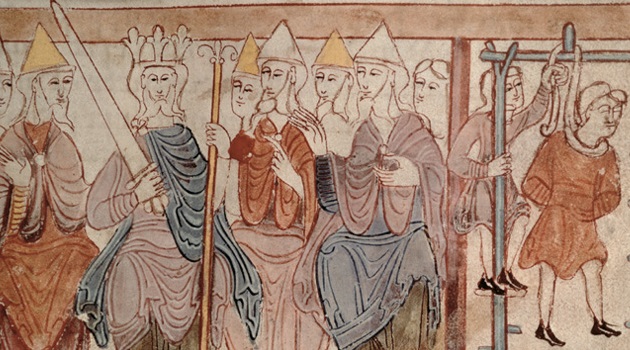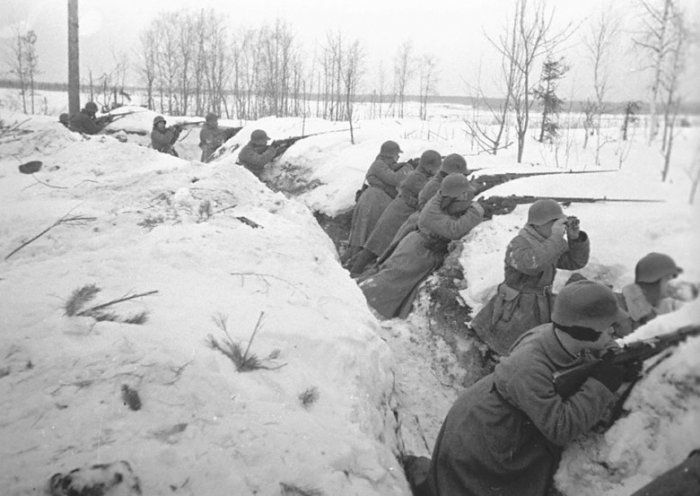Quote of the Day: Bruce Benson On The Origins of Government Law
"Anglo-Saxon kings saw the justice system as a source of revenue, and violation of certain laws began to be referred to as violations of the 'king's peace.'" - Dr. Bruce L. Benson
People discuss the origin of specific laws all the time. We want to know why it was passed, who's benefiting, what sort of ulterior motives were at play, and so on. But we need to take a closer look at the origins of government lawmaking in general. Believe it or not, the government monopoly over law and order is a relatively recent phenomenon. There was a time when a crime simply meant a wrong-doing against another person (theft, assault, rape, fraud, and murder). And there have been many non-governmental systems (without centralization and monopolization of force) all over the world that have carried out justice for these crimes; private law, customary law, merchant law, tribal law, common law, etc. The Benson quote comes from his book The Enterprise of Law: Justice Without The State. In this passage, he is discussing the point at which government started to get into the law business. The kings (and now modern governments) saw that they could profit in power and money if they started to become the sole provider of legal services. Slowly, over a thousand years, a crime has been transformed, from a specific and objective thing, to now meaning anything a government wants it to mean.
As Benson points out, nearly a thousand years ago, the idea was birthed to turn crimes from an act against another human being into a general, subjective act against the "king's peace." This was the beginning of the government takeover of law. Since then we have seen a perversion of law. Now, "king's peace" has become "the state", "society", or the general idea of "breaking the law." People have forgotten the idea and meaning of a real crime, and now only think in terms of "breaking the law", and they see any broken law as a crime, and anyone who breaks a law, as a "bad" person. Now we have been trained to think of a crime, less as a wrong committed against another individual, and more as a general wrong against society. This is evidenced in the way justice is carried out. If someone today commits a crime against someone else, say some sort of theft, fraud, or assault, the victim, the person who was wronged, might have very little to do with the justice carried out. They usually aren't compensated or made whole either by their attacker or the government. In fact, often times they're hassled and end up having to spend more of their time and money dealing with the government. So who benefits from the justice system? The government. The victim isn't compensated. Punishments are completely arbitrary and often don't fit the crime. But, the government always wins. They get bigger budgets, more employees, and get to hand out the loot to prisons, police departments, etc. Does money collected from fines ever go to any supposed victim? Of course not. Fines are the government's plunder, and furthermore, most "crimes" with fines have no victim to compensate, because they are victimless acts.
Of course, the examples are endless. Today, it is a crime to cross the street at the wrong place, drive my own private property at the wrong speed, tell the public about government wrongdoings, carry the wrong thing at the wrong place and time, build on my own property without a permit, sell lemonade on the street, and so on. These "crimes" are everywhere. It waters down the real meaning of a crime if almost everything is a crime. When selling a plant to a willing customer can get you as much prison time as killing someone, you know there is something wrong with your system of law and justice.
And we must remember, also as Benson points out, why the kings wanted to get into the law business. The found it profitable. These were essentially primitive modern nation states, They saw the profitability in being a government. It wasn't just about being an idle king anymore. This is vitally important. Despite the propaganda, modern governments are not selfless entities of the people, by the people, and for the people. Think of them as modern mutations of ancient kings. The king will do what is best for the crown. And today it is no different. It is very lucrative to provide the infrastructure of law; the buildings, the judges, the procedures, the prisons, the contracts, and of course, the laws themselves. They can pass a law for anything. Anything can be made "good" or "bad, "right" or "wrong", simply with the signing of a new law. Government now, as it was a thousand years ago, is the great trader of influence and favors. Centuries ago you had ambitious advisors whispering in the king's ear, promoting the interests of himself and his wealthy friends. Today, you have cronies, lobbyists, bureaucrats, and unions. Everyone wants to get a piece of the pie! Why they don't realize is the unseen, that with every law passed and enforced by government that they think will benefit them, there are a thousand more which harm them. And with every new law passed more harm is done to a society, making it less free and less prosperous.
The other way governments gain from this setup is the power and legitimacy it provides them. Every sentence pronounced is one more example where they can say that justice has been served, they got the bad guy, and that they are keeping order in society. Law, security, and defense are the essential things most people think governments are absolutely necessary for. So from the government's perspective, these industries must be the most monopolized, the most controlled, and most protected, to constantly remind us that without them chaos would ensue. They must have a "strong" legal system with lots of police, judges, harsh sentences, laws for everything, etc. It shows the scared masses that everything is under control and the bad criminals are being kept at bay by the only entity apparently capable of doing it, the state. But, as Bruce Benson and many others have pointed out, there are many ways, and many real world examples of law and order without a violent, monopolistic state. We must be consistent. If monopolies are bad, monopolies are bad. We should not grant an exception to the state. The propaganda story goes that modern governments arose, and then order, wealth, and progress followed as a result. But, it is actually the other way around. Society, natural law, customary systems, order, economics all come first. Governments come next, to gain power and extract the wealth that society is creating. We are told that without government, gangs will come along and take our money, attack us, and take advantage of society. Well sorry to break it to you folks, government is that gang. Society, armed with the market and the non-aggression principle, can handle itself. No need for gangs or their arbitrary laws.
Further Information:
- Bruce Benson on Libertarianism.org discussing his book
- The First Edition of Benson's book, available for free as a PDF
- The Enterprise of Law on Amazon
- Article on the book at FEE
- Article on the book at The Independent Institute
- Many more links, books, articles, and videos at our Anarchy Resource page (under construction) on similar and related topics






